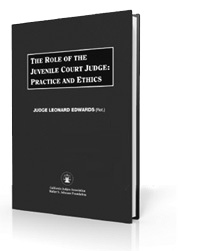An interview by a representative of the American Bar Association’s Child Law Practice. In it Judge Edwards explains why he wrote his most recent book, “The Role of the Juvenile Court Judge: Practice and Ethics.”
BOOK for Juvenile and Family Court Judges
THE ROLE OF THE JUVENILE COURT JUDGE: PRACTICE AND ETHICS
by Judge Leonard Edwards, Retired
Available from caljudges.org
[See a brief video interview on this topic. Also reviewed by Hon. Janice M. Rosa (ret.).]
BOOK REVIEW by Judge Margaret Henry
Juvenile Court is different and so are the ethics that apply to the judges who sit in Juvenile Court. I recall at an ethics training by CJER early in my Juvenile Court judicial career the instructor saying, “A judge may not accept a gift from any party, ever. No exceptions.” My hand shot up. She looked at me and repeated: “No exceptions.” I said: “What about a picture from an 8 year old autistic boy who is a dependent appearing in front of me?” She stared at me for a few seconds, and then said, “OK. There is an exception.”
There was nothing in writing at that time—more particularly, nothing in Judge David M. Rothman’s California Judicial Conduct Handbook that supported the position of an exception. Judge Rothman’s book is, of course, the gold standard of judicial ethics books. As comprehensive as it is, it does not detail the distinctions in the role of the Juvenile Court judge.
Judge Edwards’ new book explains the unique role of the Juvenile Court judge in the context of discussions of ethics. The book takes a very different approach, in structure and content, from California Judicial Conduct Handbook. Judge Edwards’ book uses hypothetical scenarios that Juvenile Court judges may encounter in their work on the bench, identifies practice and ethical issues, and proposes approaches, offering advice and solutions to the judicial officer. The focus is on practical, ethical issues that the Juvenile Court judicial officer encounters.
The book is well indexed and organized. It is divided into three parts: Running the Juvenile Court, Ex Parte Communications, and Working Off the Bench. Each has approximately 30 sections with several scenarios. The Table of Contents can be used to find an exact discussion of an issue facing a Juvenile Court judge.
The author of this book explains the unique role of the Juvenile Court judge and that judges must not shy away from the responsibilities that come with the role. The Introduction to the book should be mandatory reading for all new judges to the Juvenile Court. Experienced juvenile judges will read the Introduction and think, “Exactly. That explains the difference in our role.”
This is a book for specialists—Juvenile Court judges. It should be kept in easy reach of each of us in chambers, right next to the California Judicial Conduct Handbook.
Judicial Ethics
An interview by a representative of the American Bar Association’s Child Law Practice. In it Judge Edwards explains why he wrote his book, “The Role of the Juvenile Court Judge: Practice and Ethics.”
The Hon. Janice M. Rosa (ret.) reviews Judge Edwards’ book The Role of the Juvenile Court Judge: Practice and Ethics.
October 2014, Family Court Review: An Interdisciplinary Journal
Ethical Problems Involving Judicial Fundraising
Spring 2014, The Bench, the official magazine of the California Judges Association
CASA Programs and Judicial Ethics
July 2013, The Judges’ Page Newsletter, The National CASA Association
Ethical Issues in the Family Drug Treatment Court
Winter 2013, Juvenile and Family Court Journal
Ethical Challenges for the Juvenile Court Judge
Winter 2011, Juvenile and Family Court Journal
